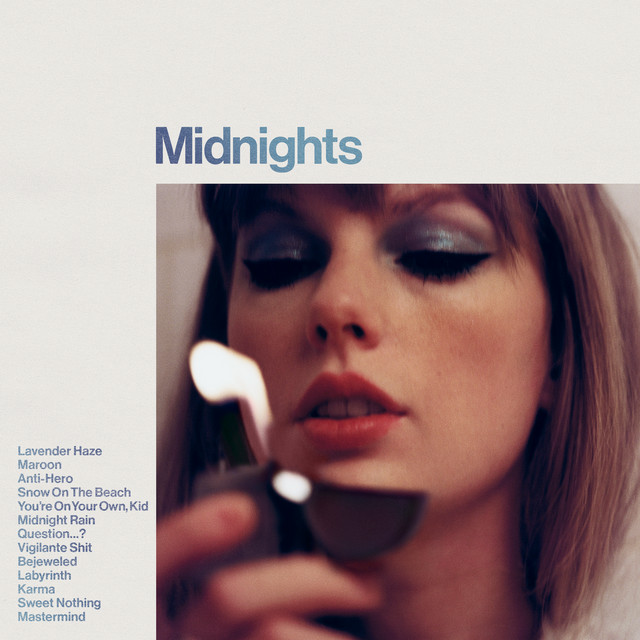“Midnights:” It’s Not As Bad As You Think
Taylor Swift released her highly-anticipated 10th studio album, “Midnights,” in October. Because Taylor is known for her ever-changing eras, many fans anticipated a change in genre — and they couldn’t be more spot-on. While her most recent works “folklore” and “evermore” were lyric-focused, “Midnights” focuses heavily on sound. Full of vocal effects, synths and campy lyrics, the album is certainly a step away from the understated and intimate lyricism of her last two albums.
At first glance, the album may feel like any other nondescript pop album — there is something to be said for the thematic consistency within the work. For example, lyrics regarding oppressive gender roles are evident throughout several of the tracks, specifically “He wanted a bride, I was making my own name” from “Midnight Rain.” Taylor’s writing about the societal pressure she faces to prioritize her romantic life over musical pursuits is incredibly poignant. As she’s gotten older it’s become even more pressing, as she deals with constant speculation around her sexuality and marital status.
Additionally, tracks like “Karma” and “Anti-Hero” are undeniably cleverly written, playing into Taylor’s villainization in popular culture and media. “You’re On Your Own, Kid” is also strong lyrically, telling a story that spans many years and then a realization that you alone are responsible for yourself. Even so, the lyrics are not what stand out about this album. “Karma” also has impeccable production, quintessentially poppy but still fresh, something you can’t help but dance to. Furthermore, “Snow on the Beach,” which features Lana Del Rey, is another prime example of the production on the album. Reminiscent of Jack Antonoff’s co-production on “August” from “folklore,” his work on “Snow on the Beach” is dreamy, with layered vocals and impressive production. The combination of Taylor and Lana’s voices is ethereal and even haunting. Similarly, the production of “Sweet Nothing” is simple but lullaby-like, and builds fantastically in the latter half of the song.
While the original album has 13 tracks, Taylor also released the “3am edition,” which includes seven extra tracks. Standouts from this selection include “Would’ve, Could’ve, Should’ve,” and “The Great War” which are strong both lyrically and sonically. Thematically, however, these tracks are wildly different. “Would’ve, Could’ve, Should’ve” explores Taylor’s relationship with a 32-year-old John Mayer when she was 19. The lyrics “Give me back my girlhood, it was mine first” exemplify the pain of a past wound that won’t close. “The Great War” tells the tale of a relationship filled with hardship through the hyperbolic lens of World War I.
That being said, sound is truly the focus of “Midnights,” which is clear in tracks like “Lavender Haze,” “Maroon,” “Midnight Rain” and “Bejeweled,” which are all songs that rely heavily on vocal effects and synths. Though the album is somewhat scattered thematically, it’s safe to say that much of the production is of a good quality, even if it may be a dramatic shift from Taylor’s last two albums. “Midnights” is a step out of Taylor’s established comfort zone. With hints of genres like electronic and dream pop, ones she has notably never explored before, this album is an experimentation. It may not be as cohesive as her previous work, but why not let her have fun? Artists are allowed to change, that’s what makes Taylor so exciting. She’s constantly changing and reinventing herself and subverting expectations, an unpredictability that keeps people paying attention.







